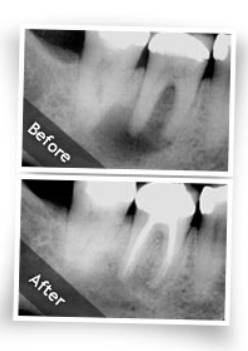It Is Suitable For
· Those in Chiang Mai, Thailand for at least 2 or 3 weeks.
· Those with extremely sensitive teeth.
· Those with small bumps on their gums.
· Those who wish to treat their swollen or inflamed gums.
· Those who wish to prevent further decaying of teeth.
What is Root Canal Treatment?
Root Canal Treatment, also known as endodontic treatment, is a dental procedure used to treat the inside of a decayed or infected tooth to prevent further decay.
Often, root canal treatment is needed when the pulp is damaged or when the nerve of the tooth is infected. The infection or inflammation can be caused by many factors, such as tooth injury, deep decay, a crack or chip in the tooth, and a few others.
If damaged teeth remain untreated, the infection in the root canal can lead to swelling that can extend to other parts of the face, neck or head or the bone surrounding the root tip can be lost.
How It Works
During this procedure, the nerve and the pulp are removed, and the interior of the tooth is cleaned and sealed.
Root Canal Treatment Procedure
1. X-Ray is taken to study the shape of your root canals and check any signs of infection.
2. Anesthesia is administered to numb the area near the tooth.
3. A rubber dam is positioned around the tooth to keep it dry and saliva free.
4. The access hole is drilled into the teeth.
5. The pulp, bacteria, dead nerve tissue, and other debris are removed from the tooth.
6. The tooth is regularly flushed using water of sodium hypochlorite.
7. Your tooth is sealed (this can be done instantly or often preferred a week after as infection needs to be medicated first).
8. A temporary filling is placed if your tooth is not sealed on the same day.
9. A crown or other restoration is placed on the tooth as protection.
Advantages and Limitations of Root Canal Treatment
<Advantages>
· Relieves pain
· Prevents future infection or inflammation
· Short downtime
· Safe treatment
<Limitations>
· Tooth may tend to be brittle and prone to fractures
· More expensive than a tooth extraction
Treatment Post Care
· Brush your teeth at least twice a day - after eating and before bedtime to maintain good dental health
· Floss your teeth once or twice a day
· Rinse your mouth with an antibacterial mouthwash for at least once a day
· Be careful in chewing toffees, gum, and hard food
· It is advised to schedule for regular dental check-ups
FAQ
Q1: What is the difference between root canal and extraction?
A1: Root canal is often the preferred choice as it works on fixing your natural tooth so that it is able to continue remaining in place. However, if a tooth is far too compromised, then you might be recommended to get an extraction, followed by a dental implant to replace what was lost.
Q2:Is this treatment painful?
A2: Generally, no. The pain you usually feel is caused by the infection or injury in the tooth, not the treatment itself. Instead, root canal treatment is usually performed to eliminate pain.
Q3: What happens if I do not treat my pulp/tooth root?
A3: If left untreated, pulp inflammation or infection can cause severe pain or give rise to an abscess. Damaged nerve or pulp tissue becomes food to bacteria, which begin to multiply within the pulp chamber. This condition can lead to an abscessed tooth. An abscess is a pus-filled sac that develops at the end of the tooth’s root.
Clinic Information
[Clinic Name] Kitcha Dental Clinic
[Location] Chiang Mai, Thailand
[Nearest Stations / Attractions] Located right in the center of Chiang Mai - Chang Lor Road, across Chiang Mai Gate Market. A 10 mins driving distance from Chiang Mai International Airport.
[Clinic Opening Time] Monday - Sunday (9:00AM-8:00PM)
Terms of Service
Trambellir is a health tourism platform and does not in any way provide, promote, or sell any
medication or medical treatment to the Customers.
Customers are advised to contact the healthcare providers directly for any enquiries related to
medical treatments.






